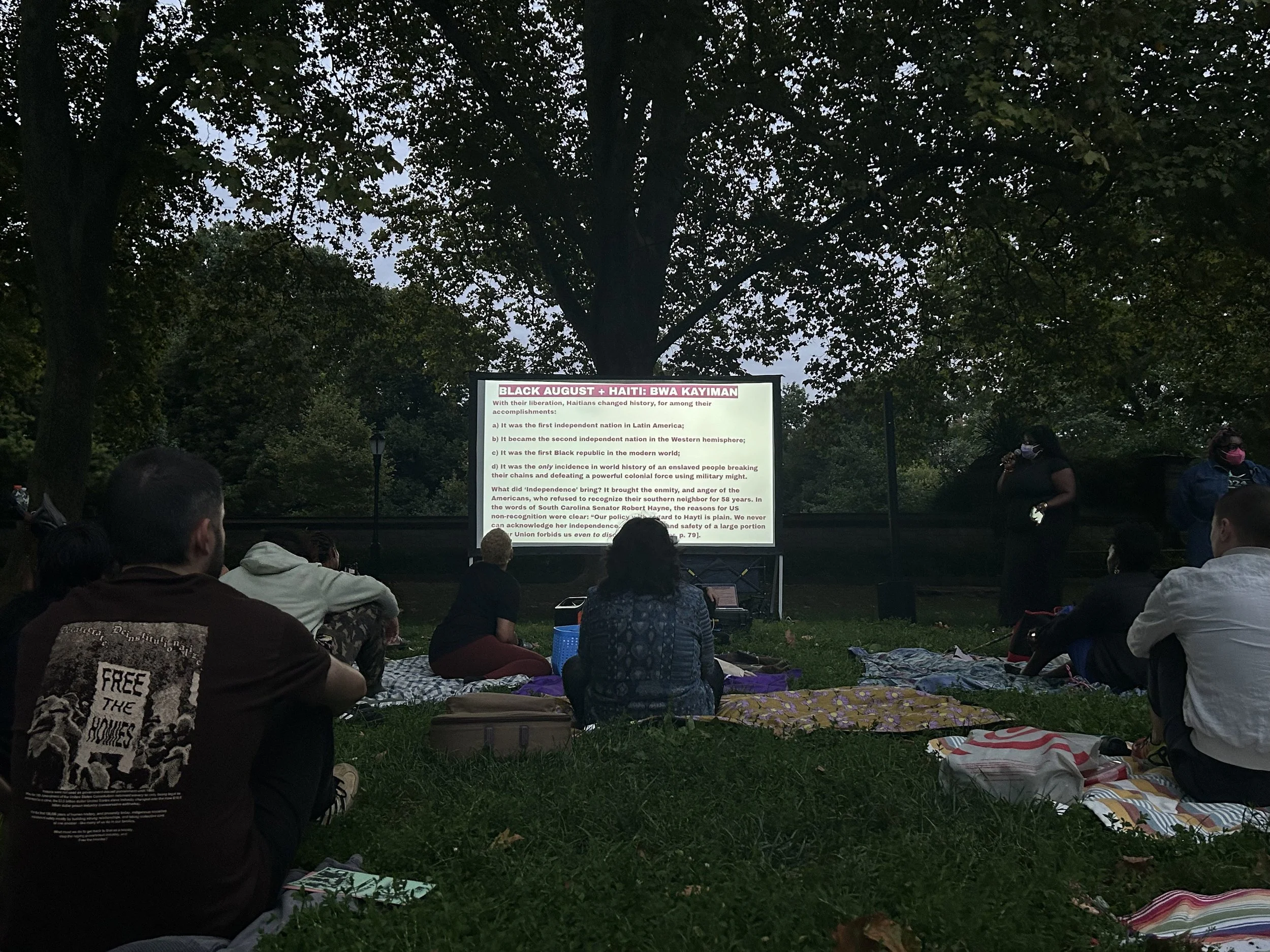“Haiti Has Roots in Black August” Movement Educates and Mobilizes New Yorkers
Rasanbleman Pou Ayiti NYC’s political education and film screening event with Cinemóvil NYC on August 30 wraps up the group’s Black August actions.
By Claudia Gohn
Rasanbleman Pou Ayiti political education and film screening event in collaboration with Cinemóvil NYC
On Friday evening, attendees of the “100 Year Class War on Haiti” political education session and short film screening in Prospect Park, Brooklyn, gathered around a projector, sitting on blankets and holding pamphlets. The title projected onto a screen read, “100 Year Class War of Haiti,” a powerpoint about the political and economic history of Haiti, including the roles of colonialism and consumerism.
“We're here because we really want to organize people like us—people who are in the diaspora, people who are forced to be displaced from Haiti,” A.D., an organizer for Rasanbleman Pou Ayiti, said. “Because what's going on right now in Haiti, it involves all of us.”
The event, hosted by Rasanbleman Pou Ayiti, was the culmination of a month-long series of events in honor of Black August, and included an educational powerpoint alongside the screening of three short films highlighting different themes that each examined how Western colonization has affected Haiti. The films reviewed how colonization set the stage for an unstable economy, labor exploitation, and ongoing neocolonialism. The overarching goal was to facilitate dialogue and learning for the New York City community about the state of Haiti.
Black August is a month that commemorates the lives of those who have contributed to the fight for Black liberation, particularly political and economic liberation, including those who have been incarcerated or lost their lives for the struggle. In honor of Black August events—hosted by several organizations in addition to Rasanbleman Pou Ayiti, such as Black Alliance for Peace NYC, ANSWER Coalition, Bronx Anti War Coalition, and more—educated and mobilized New Yorkers as part of the series called “Haiti Has Roots in Black August.”
“Black August is a really important month to folks who believe in black liberation and commemorating those that have done the struggle before us,” Obi said. “How do we continue that and educate people? I love Black August in comparison to like Black History Month. Black August is something that's difficult to co-op.”
“No one wants to make that a fun thing [to] study and train. So I think it's really great to connect this black liberation movement to Haiti and its history just because the connection in regards to Black Internationalism to me is always important to think about,” said the organizer.
Obi and A.D. both felt more comfortable using only their first names. Many activists are doxxed or face retaliation in response to speaking out and organizing.
The films screened were Agwe (Samuel Frantz Suffren, 2021), Mickey Mouse Goes to Haiti: Walt Disney and the Science of Exploitation (Rudi Stern, 1996), and Courage de Femmes (Arnold Antonin, 2000), all three of which covered topics ranging from complicit consumerism to colonialism’s lasting impact on the economy.
Before the event began, a couple of organizers, including A.D., stood at a table at the entrance to the park with pamphlets about the Haiti and other oppressed communities struggles, as well as CitiBank’s economic exploitation and cooperation with the United States’ interference in Haiti.
A.D. clarified that this was a political education event and not a cultural event—not just a screening. “We're not just showing the movies. We also have slides that we present with them. And the slides, they give a little bit of context,” A.D. said. “We’re pushing people to think about it a little bit more deeply, what they're seeing.”
Obi said he didn’t learn about Haiti while going to school in New York growing up. Events like Friday’s give New Yorkers the space to be educated.
“To have these conversations and educate people about the liberation movements that have existed historically I think is really important. And to have a space where this is accessible to anyone,” Obi says. “Cinemóvil does this for free. We do the viewings and it's in very public spaces that is accessible to anyone. It’s incredibly important in regards to outreach and making sure that what we're trying to provide as education is available to everyone.”
Claudia Gohn is a co-founder and co-editor-in-chief at Grassroots. She can be reached at claudia@grassrootsmagazinenyc.com

